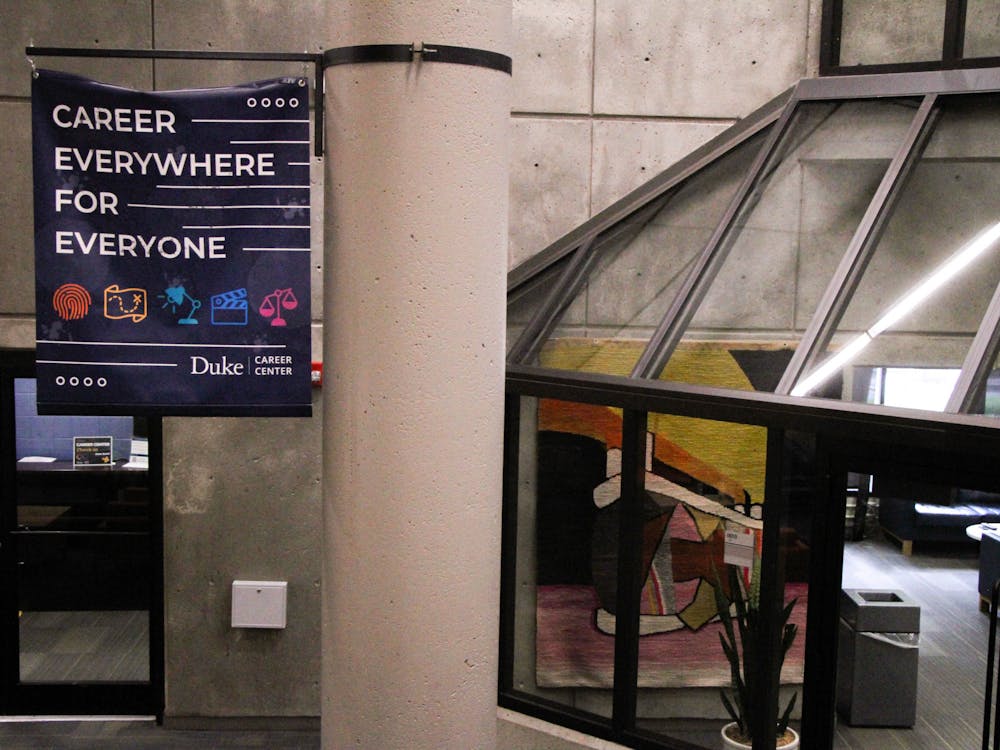As one-on-one appointments with the Career Center become available for first-year students this Friday, students may wonder: What does the Career Center offer?
The Duke Career Center helps prepare students for their future careers through consultations, training programs and career-discovery events. Its offerings extend to undergraduate, master’s and doctoral students, as well as alumni for one year after graduation.
“We're trying to foster career readiness for students,” said Rachel Coleman, director of career development and education. “That is [the] development of skills and knowledge to help them feel prepared and competitive in an increasingly dynamic workforce and to help them find opportunities that really align with their values and their goals.”
One main way students can utilize the Career Center is through advising. All students can utilize “drop-in advising” for answers to quick questions or advice on application materials.
One-on-one appointments, which are used to explore students’ strengths and interests, career search plans and interview preparation, can be scheduled on Handshake.
Coleman explained that while first-year students have access to all other Career Center resources, the “pause” on one-on-one meetings for first-years is intentional.
“We want to give students time to get settled into Duke, to focus on learning [about] Duke and to build their own community … social supports [and] their own wellness,” she said.
The Career Center will host a kickoff event for first-year students this Thursday in Gilbert-Addoms dorm where students can discover career communities and opportunities.
Outside of scheduling appointments, students can also use Handshake to explore internship and job opportunities, as well as a range of career-readiness events. Events organized by the Career Center can also be viewed by students on Career Hub.
The Career Center focuses on the Career Development Process, in which students reflect on their current progress in developing career-relevant skills.
“The cornerstone of the process for most students is enhancing or clarifying self awareness,” Coleman said. “What are their values, what are their interests, what are their skills?”
She further emphasized the importance of readiness skills as some students prepare for careers that “don’t exist yet,” including fields impacted by emerging technologies and AI.
However, Coleman added that students should not feel pressure to already have a plan or an idea of how to move forward when using Career Center resources.
Outside of advising sessions, another way students can develop self-awareness for career readiness skills is FOCUS2Career, an online system with self-assessments and planning tools.
“FOCUS2 is one thing that we use with students frequently when they're in that discover and explore stage, as well as the strengths profiler,” she said. “[The strengths profiler] is a tool that helps students identify their realized strengths, unrealized strengths, learned behaviors and also some of the areas that might be more challenging for them.”
Coleman added that differing strengths, interests and experiences mean that all students inevitably have diverse paths, and thus the Career Center seeks to personalize their services for individual students.
One way the Career Center pursues this goal is through the Career Communities Model, which helps students tailor resources to their own interests.
The Career Center offers additional tools including Big Interview, an interview practice platform, Jobscan, a platform for resume building and analysis, and Interstride, a platform to help international students find opportunities in over 160 countries.
Get The Chronicle straight to your inbox
Sign up for our weekly newsletter. Cancel at any time.
Winston Qian is a Pratt sophomore and health/science editor for the news department.

